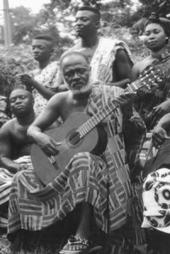P alm Wine Highlife music was one of the two main introductory branches of Highlife Music. Unlike the Dance Band Highlife which employed large scale string and brass orchestras, Palm Wine Highlife was a neo-traditional African style which employed folklore and traditional acoustic string instruments like the Seprewa and the Guitar.
In general, Highlife Music began in the early 1900s along the coast of Liberia and Ghana with local rhythms and idioms. By the 1920s, Palm Wine Highlife music had gained a footing in Ghana and one of the foremost seprewa-ists and guitarists, Kwame Asare, went on to record for Zonophone in 1928, which included the Highlife classics "Yaa Amponsah," "Kwaku Anansi" and "Adwoa Yanki." This series of recordings in 1928 was one of the foremost Palm Wine Highlife recordings in Ghana. Kwame Asare was compelled to record under the name Jacob Sam.
By the 1930s, Kwame Asare had taught his nephew, Kwaa Mensah the guitar and Kwaa had begun performing locally. By the 1940s and 1950s, Palm Wine Highlife had become popular with pivotal contributors like T.O. Ampomah, affectionately known as T. O. Jazz. Others were
E. K. Anang, O. B.'s Band, Osu Selected Union, Yaw Ofori Singing Band. Later on in the 1960s and 1970s, pivotal performers like Agya Koo Nimo , Nana Kwame Ampadu , John Collins, Wulomei, among others, added to the rich history and sound of Palm Wine music.
Palm Wine is a Ghanaian local drink that is tapped and brewed from the Palm tree. In a way, this acoustic and folklore Highlife music inherited its name from the fact that it gained its popularity at Palm Wine bars, which symbolically represented music of the masses.
Credit:
• The Place of Authentic Folk Music in Education, J. H. Kwabena Nketia, University of Michigan Press, 1966
• Music Makers of West Africa, J. Collins, Lynne Rienner Publishers, 1985
